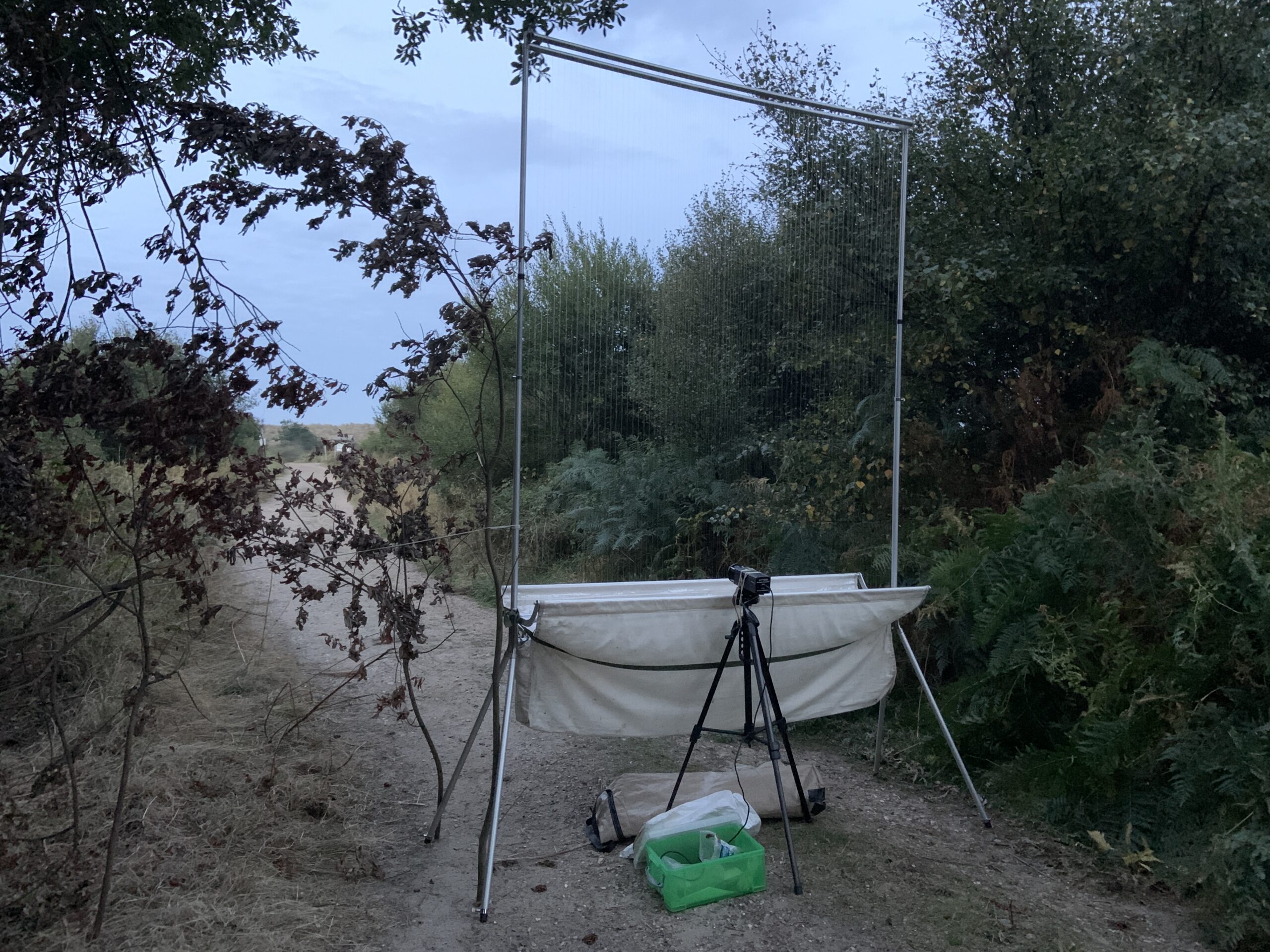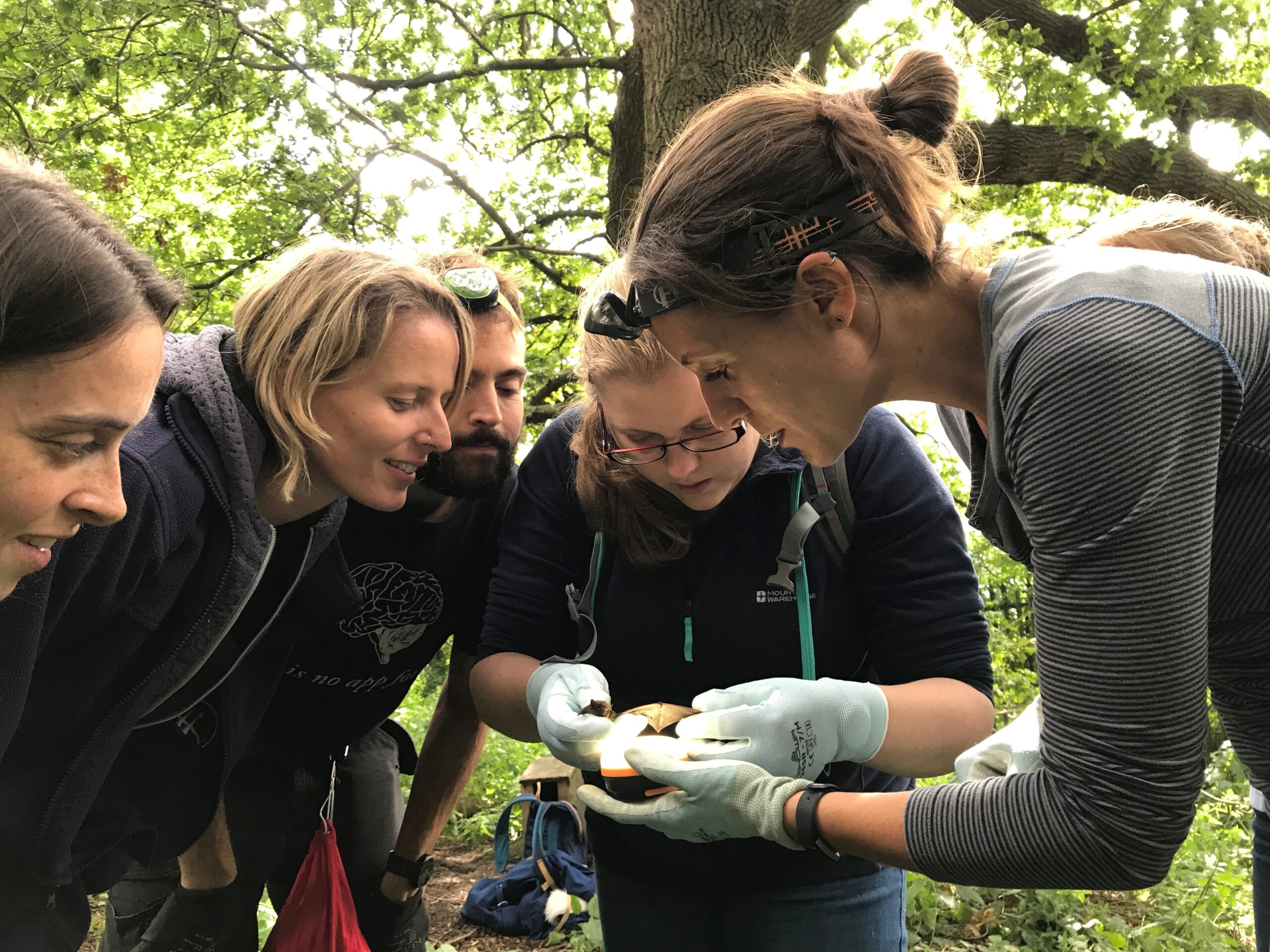Course title: Level 3/4 Bat Licence Training Course
Venue: Norwich, with field excursions around Norfolk
Duration: The course takes place over three days, starting early afternoon on the first day with a late night trapping session, full second day with a late night trapping session and finishing early afternoon on the third day.
Important: Before booking, see the “Course prerequisites & the course assessments” section below
No. attendees: 8
Cost: £985 per person
Course dates: 27-29 August 2024 (SOLD OUT)
Lead Tutor: Dr Charlotte (Lotty) Packman (other tutors will also be assisting)

About the course
The aim of this course is to provide participants with the knowledge and skills to utilise the Level 3 (CL19) and Level 4 (CL20) Bat Survey Class Licence methods. The course is designed to complement and strengthen your wider training and may be used to kick-start your training towards the Level 3/4 licences, as a ‘boost’ to your existing experience or to help you complete your training, filling in gaps and building skills and confidence.
Please note: this is an advanced course and is not intended for teaching basic bat handling skills; attendees should already be competent at handling bats (and preferably hold a Level 2 licence) before attending.
The Level 3 licence permits the disturbance and surveying of bats using mist-nets and acoustic lures (in addition to the Level 1 & 2 licence methods i.e. artificial light, endoscopes and capture by hand and static handheld nets).
More information on the Level 3 Class Licence can be found here.
The Level 4 licence permits the disturbance and surveying of bats using harp-traps and acoustic lures (in addition to the Level 1 & 2 licence methods i.e. artificial light, endoscopes and capture by hand and static handheld nets).
More information on the Level 4 Class Licence can be found here.
Common applications of the Level 3/4 licences
- Capture surveys to identify/confirm species in the hand, where cryptic or acoustically indistinct species are likely to be present
- Surveys of species that are poorly represented in acoustic surveys (due to quiet echolocation calls)
- Research and/or monitoring projects requiring collection of biometric data
- Assessing breeding/non-breeding status
- Capture of bats to attach radio-tags for radio-tracking projects
- Capture of bats to attach rings for long-term monitoring projects
- Capture of bats for collecting samples for DNA analysis/genetic studies
Level 3/4 course learning outcomes
- Identify suitable locations for positioning mist-nets and harp-traps
- Demonstrate correct methods for assembling and taking down harp-traps
- Demonstrate correct methods for setting up and taking down mist-nets
- Explain protocols for the safe and effective running of trapping surveys using mist-nets, harp-traps & acoustic lures
- Safely and effectively position and operate acoustic lures in conjunction with harp-traps/mist-nets
- Demonstrate safe and effective methods for extracting bats from mist-nets
- Demonstrate safe and effective methods for handling and processing bats
- Identify bat species in the hand
- Determine bat sex, age and reproductive status
- Take accurate biometric measurements (forearm and weight)
- Explain what actions can and cannot be carried out under the Level 3 and 4 Bat Survey Class Licences
- NB this course does not cover radio-tagging or ringing (these methods are not covered by the Level 3/4 licences, instead requiring an individual project licence)
What is required for Level 3 and 4 licences?
It is useful to know the competencies and experience you should be working towards gaining before applying for a Level 3 and/or 4 licence. Currently there are no standardised guidelines on experience criteria, so these are our recommendations only, based on our experience training many ecological consultants, researchers, students, bat group members and volunteers.
Level 4 licence
The Level 4 licence requires less experience and training time to meet the necessary standard compared to the Level 3 licence. Those wishing to apply for their Level 4 licence must be able to safely, confidently and competently:
- Select suitable locations for positioning a harp-trap
- Assemble and take down a harp-trap
- Position and operate an acoustic lure and understand precautions needed when using a lure
- Run harp-trapping (with an acoustic lure) surveys, following safe and effective protocols
- Demonstrate the Level 1 & 2 licence methods, in particular handling and processing bats and bat species ID
Level 3 licence
The Level 3 licence requires a substantial amount of mist-netting experience, in particular with extracting bats (and the occasional bird) from mist-nets. Those wishing to apply for their Level 3 licence must be able to safely, confidently and competently:
- Select suitable locations for positioning mist-nets
- Put up and take down mist-nets
- Position an operate an acoustic lure and understand precautions needed when using a lure
- Run mist-netting (with an acoustic lure) surveys, following safe and effective protocols
- Safely and effectively extract bats from mist-nets
- Demonstrate the Level 1 & 2 licence methods, in particular handling and processing bats and bat species ID
Typically those considering applying for a Level 3 licence will need to have extracted in excess of 100 bats of a range of species from mist-nets in order to have gained sufficient skills and experience to do so safely, competently, independently and to have encountered most of the likely extraction ‘scenarios’. The exact figure needed to reach a competent level varies considerably between individuals, so this is an indicative guide only. When mist-netting for bats, accidental captures of birds can occur, therefore we include a bird mist-net extraction ‘taster session’ in this course (with a fully-licensed bird mist-netting Trainer), as you must be able to safely extract any birds that could inadvertently be caught in nets. We strongly recommend that you seek regular bird mist-netting extraction training and practice with your local bird ringing group.
Licence reference (‘Course Completion Certificate’)
To meet the standard needed for the Level 3/4 licences, participants will need to have additional experience i.e. the course alone cannot provide all the experience you will need for your Level 3/4 licences. As described above, this course is intended to compliment your wider training, providing a ‘boost’ to your experience and skills or, potentially, to complete your training towards the licence. Please note that provision of a ‘Course Completion Certificate’ (for Level 4, Level 3 or both levels), which can be used in place of one reference for a licence application, is at the discretion of the course tutor and will only be provided if the tutor is fully satisfied that the participant has met the required standard, has passed the course assessments and following review of a satisfactory training log. Following the course, all attendees will be provided with a Continuing Professional Development (CPD) Certificate.
Course prerequisites & the course assessments
When you attend the Level 3/4 course you must already be competent at handling and processing bats (we will teach some more advanced handling, processing and ID skills) and also preferable already hold a Level 2 Bat Survey Class Licence (CL18). We strongly recommend training and applying for your Level 2 licence before embarking on Level 3/4. If you do not hold a Level 2 licence, please contact us to discuss before booking. The written and practical assessments may cover some broader knowledge areas, to ensure participants have the expected level of knowledge for the Level 1 & 2 licences (as these methods are included in the Level 3 & Level 4 licences), in addition to focussing on the specific Level 3/4 topics.
The written and informal practical assessments will help to identify your competence level and highlight areas where you may need more practice/experience/knowledge.
After the course, we will provide you with a mark for your written assessment and feedback on both the theory and practical elements to help with your learning.
Rabies
You must be fully vaccinated against rabies (and up to date with any boosters needed). Please note, the vaccination process can take a considerable amount of time so this needs to be planned well in advance of attending the course if you are not currently vaccinated. You will need to confirm your rabies vaccination status prior to attending the course.
About the course Lead Tutor
Our Principal Bat Ecologist Dr Charlotte (Lotty) Packman specialises in bat consultancy, research and training. Based in Norwich, Lotty holds Level 3 and 4 Bat Survey Class Licences, is a Registered Consultant for the Bat Mitigation Class Licence and Bats in Churches Class Licence and also holds individual bat project/research licences. Having led research at the University of Bristol on the management of bats in churches, Lotty now supervises MSc research projects on bats in the UK and abroad and has extensive experience with bat trapping and radio-tracking.
Lotty was an Assessor for the Natural England Bat Earned Recognition pilot scheme and a member of the Technical Review Panel for the updating of BCT’s Bat Surveys for Professional Ecologists – Good Practice Guidelines (4th edition). Lotty is a Fellow of the Royal Society of Biology and a Chartered Biologist.

Level 3/4 Bat Licence Training Course
27-29th August 2024

